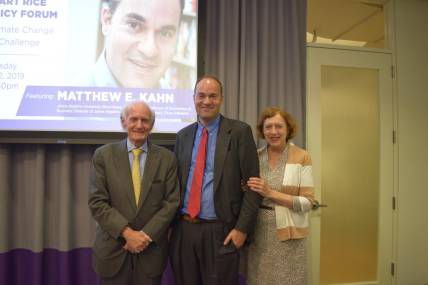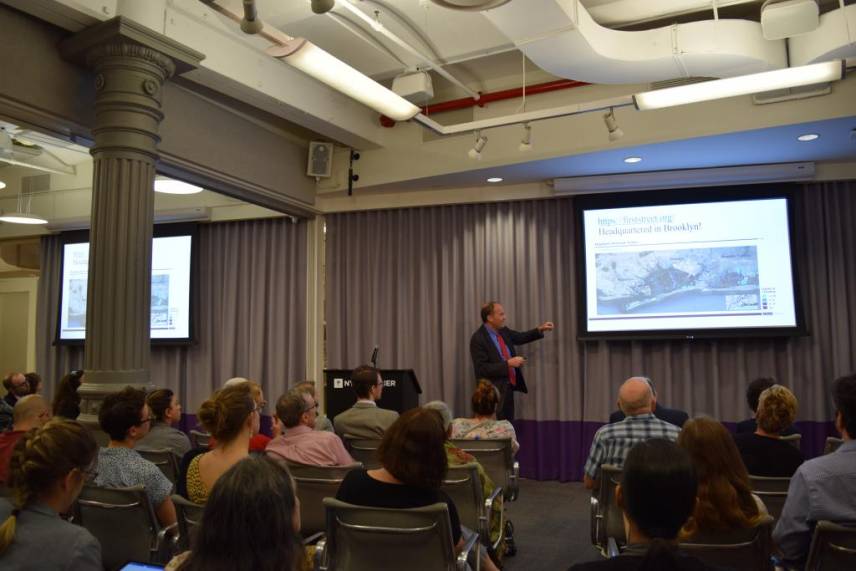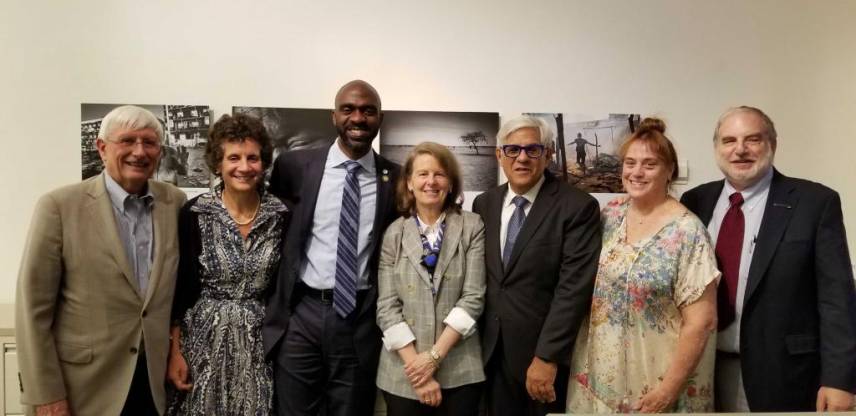Climate Resilience Strategies to Mitigate the Risk of Climate Change
By: Katherine Key (MUP)
On Wednesday, October 2, NYU Wagner hosted Matthew Kahn as part of this year’s Henry Hart Rice Urban Policy Forum. Professor Kahn, a Bloomberg Distinguished Professor of Economics at John Hopkins University (JHU) and the director of JHU’s 21st Century Cities Initiative, discussed the climate resilience challenge that cities face today.
Professor Kahn framed climate change as a global experiment with an unknown outcome, and his current research focuses on the risk-averse strategies individuals and society can employ to adapt to the climate challenge—specifically in location-based assets such as real estate. Because most people live in cities and are risk-averse, Khan discussed steps we can take to protect ourselves against these risks and how public servants can mitigate them. In his talk, Professor Kahn laid out several reasons to be optimistic and pessimistic about how society will adapt to climate change, and he finds hope in the big data revolution.

“Information plays a very crucial role in nudging capitalism to step up, to price the risk,” he said. Kahn mentioned that the work done by organizations such as the First Street Foundation to make data available will help buyers understand the risk of flooding and other climate shocks on a parcel of land. Professor Khan argued that similar to the Declaration of Earthquake risk in California, access to this type of data will give buyers, investors, and the mortgage industry better insights on the real estate market and will place market pressure on assets that are at risk of climate shocks.
Professor Kahn was optimistic about “the role of capitalism as a constructive force, helping us adapt [to the climate challenge].” He stated that if enough people have the same problem, it creates a market for entrepreneurs who can solve that problem, and the anticipation of great suffering from climate change will have created a market. Professor Kahn highlighted the public sector’s key role in performing climate stress tests of critical infrastructure. If these tests identify risks—and since we are risk-averse—he believes we will take proactive steps to reduce these risks.
In addition to his optimism, Professor Kahn shared some of his pessimism regarding how these climate shocks will disproportionately affect poor communities.
“Because there are so many market products that the rich can use to offset climate shocks, the poor will disproportionately bear these shocks,” Professor Kahn lamented. He pointed to products that make extreme days more bearable—a cell phone, refrigerator, air conditioning—that economically disenfranchised people may not be able to afford. He also noted that a lot of public housing has been built below sea level, and even if the higher ground is identified, incumbent homeowners are likely to block new construction to protect their investments.
In the conclusion of his presentation, Professor Kahn declared resilient cities as growth strategies. He believes that in order to attract residents, especially young people, cities will have to implement climate resilient strategies to mitigate the risk of climate change.
Professor Kahn ended on a hopeful note saying, “I continue to be an optimist of New York because of the people that are here. Through the most severe shocks, this city has been able to reinvent itself. As strong as Mother Nature is, human capital in aggregate can step up to many of the challenges. This is the central role that universities play.”

